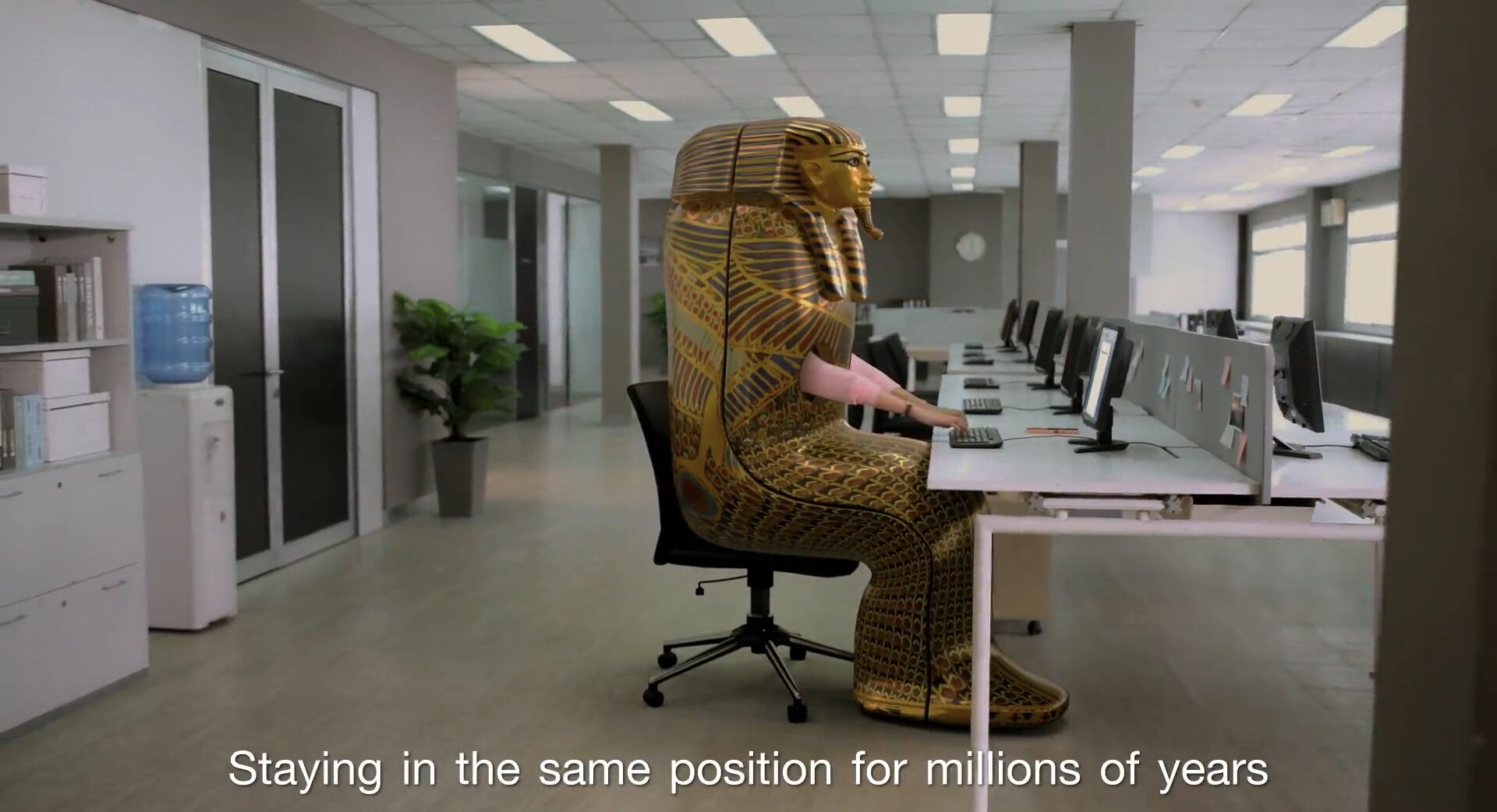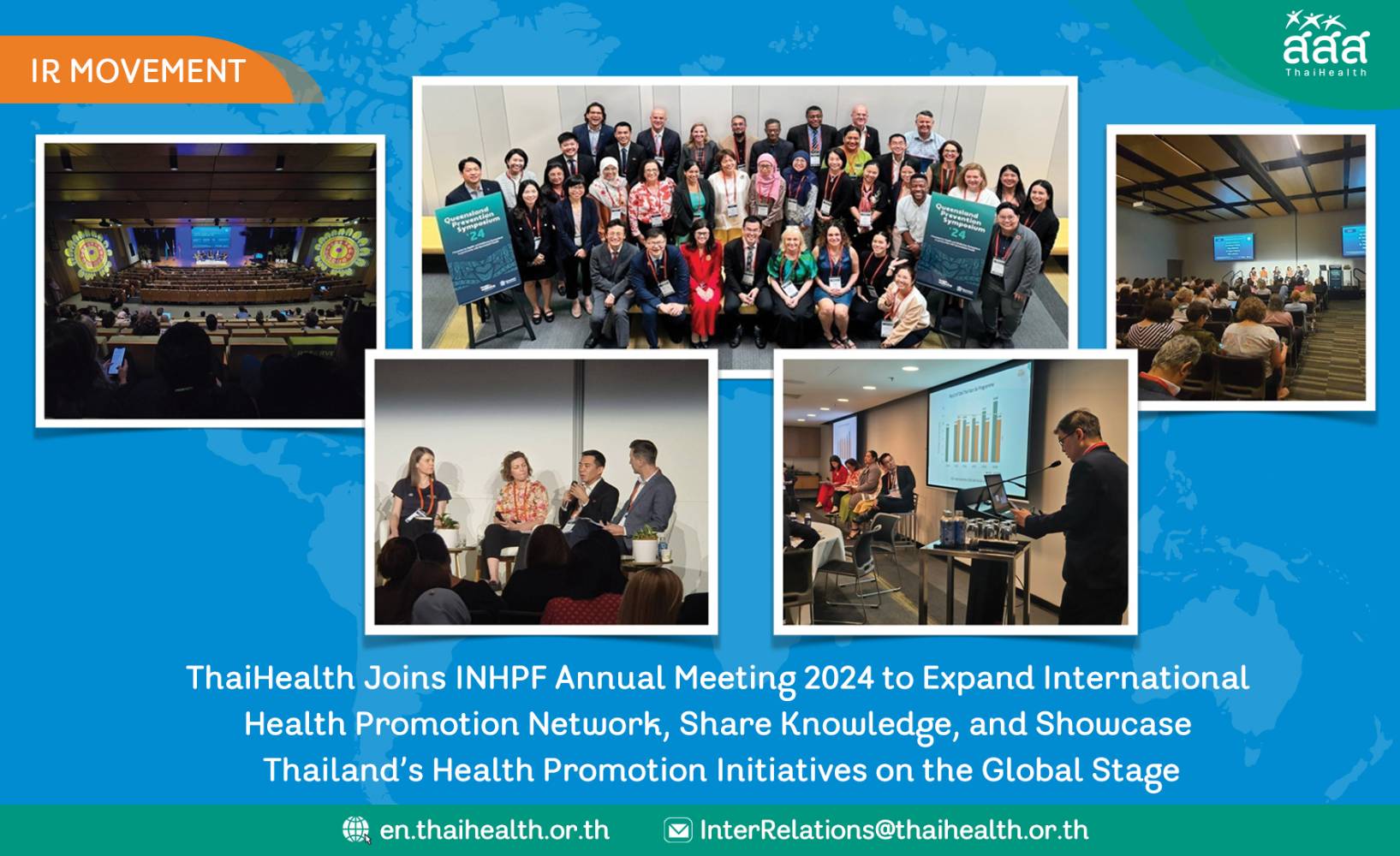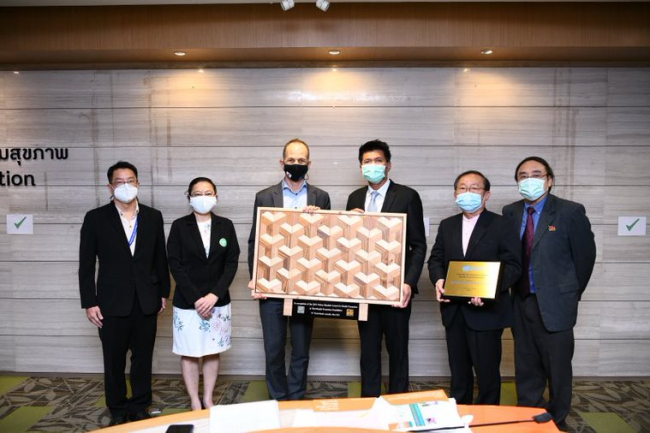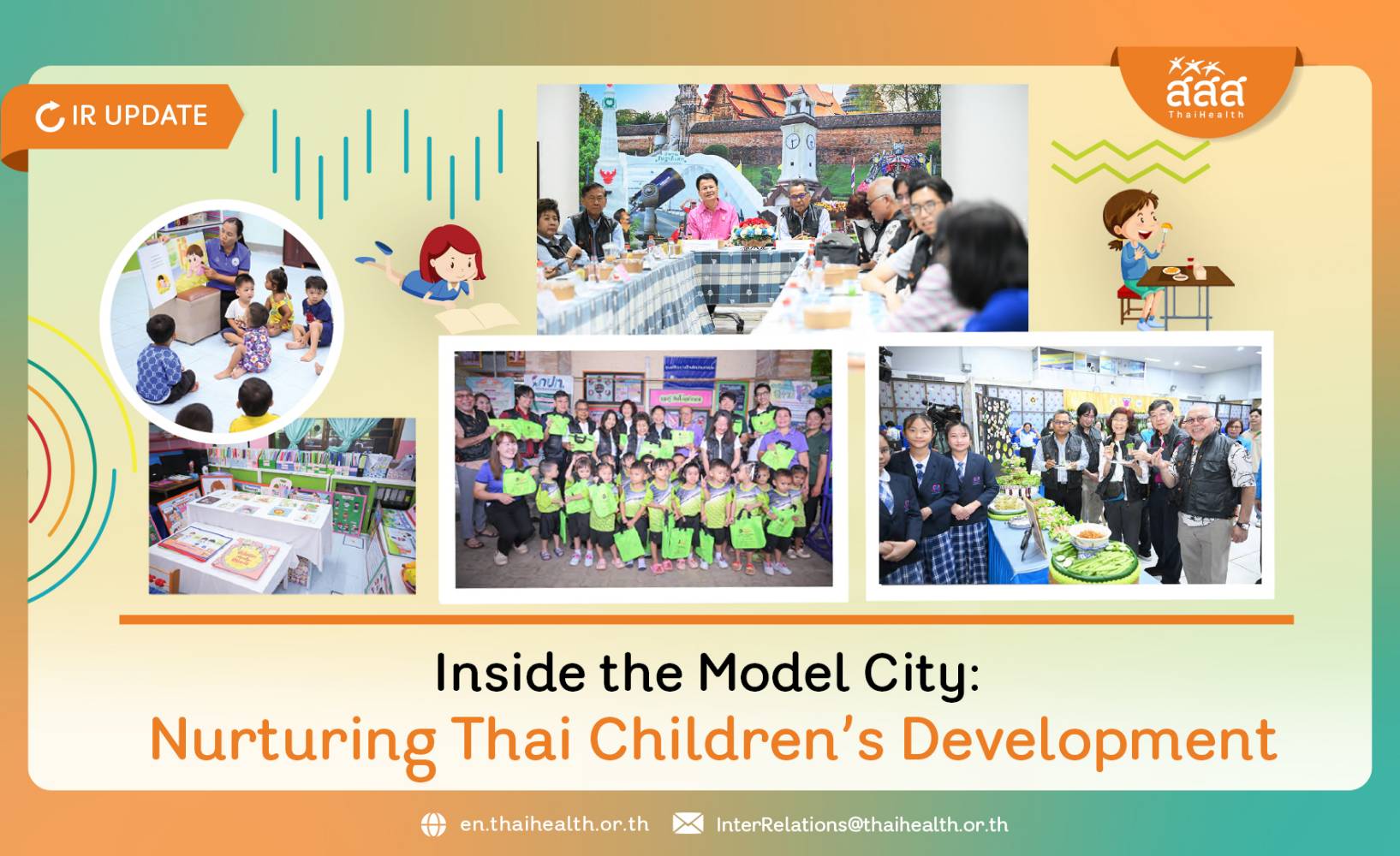
Inside the Model City: Nurturing Thai Children’s Development
Inside the Model City:
Nurturing Thai Children’s Development
Safeguarding children and youth must begin in early
childhood.
Today’s children are growing up amid constant change,
and numerous health risks.
In a world of fast-paced technology, screen time has become a normal part of children’s lives, reducing physical activity and contributing to developmental delays. Diets high in sugar, fat, and salt contribute to early onset of obesity and non-communicable diseases (NCDs), while the prevalence of e-cigarettes poses a daunting challenge.
Nurturing Thai children’s well-being is not simple, but it calls for urgent action. Recently, members of ThaiHealth’s 8th Plan Executive Committee took part in a field visit to the “United in Spirit, Building Well-being Together” (Huam Jai Huam Kor Suk) model area in Lampang Province. This showcased how ThaiHealth’s network partners united all sectors to build healthy spaces for children efficiently, delivering notable results in nurturing Thai children’s development and building resilience against various risk factors.
Early Childhood: Fostering Spiritual
Health
The Ban Tha Pong Child Development Center, managed by Soem Sai Subdistrict Municipality, is recognized as a model for promoting reading for children’s well-being. A supportive environment has been established, and both parents and local leaders recognize the benefits of reading. This has empowered them to read to children four times a day, each session featuring four books.
Within three months, children had improved their behavior, creating a better classroom atmosphere. They displayed greater focus and reasoning skills, managed the classroom independently, selected books, suggested stories to teachers, engaged in activities of their choice, and designed classroom activities.

Kanyapak Chantaseng, aged 58, shared her experience of incorporating storytelling into caring for two grandchildren. When her first grandchild came to live with her at age two, she noticed signs of screen addiction and a short attention span. He would throw tantrums when not allowed to use a phone. She wondered what to do. The Ban Tha Pong Child Development Center implemented a storytelling project, so she adopted it, reading aloud to her grandchild. Over time, he listened with focus, enjoyed the stories, and spent less time on the phone. She explained that when he wanted to use a phone, she would say the battery had run out and suggest a story instead. Over time, he gained better emotional control, becoming calmer and less quick-tempered. She later applied this technique with her other grandchild from an early age. Listening to stories from his grandmother and brother strengthened their bonds and built vocabulary, boosting his confidence to speak and ask questions in class.
In the digital age, parents occupied with earning a living cannot spend adequate time with their children. This can result in screen addiction, a lack of reading skills, and insufficient physical activity, leading to developmental delays. Children may struggle to read and lack communication skills. Thus, it is vital to cultivate spiritual health—an inner quality that can be nurtured from early childhood.
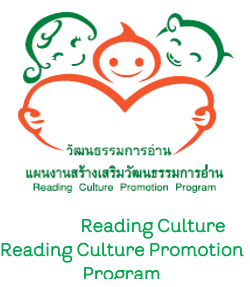
ThaiHealth believes that caring for children from early childhood through reading and recreational activities allows them to build knowledge, life skills, emotional self-regulation, and social interaction skills, enabling them to grow into quality adults. Thus, ThaiHealth supports the three following approaches:
1. Fostering children’s skills, including language, communication, emotional regulation, and skills for healthy living;
2. Empowering communities to cultivate volunteers who promote a reading culture through storytelling, strengthening relationships between children, families, and those around them;
3. Joining efforts with network partners and local agencies, especially government bodies, to promote community welfare and integrate reading into municipal policy.
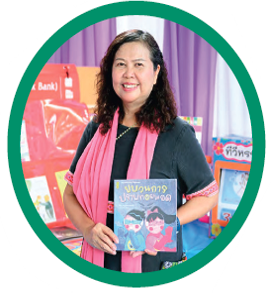
ThaiHealth has used “reading” to foster children’s holistic development and enhance executive function skills. Miss Sudjai Bhromkoed, Manager of ThaiHealth’s Reading Culture Promotion Program, pointed out that the books selected for storytelling tackle various issues, such as physical activity, nutrition, and e-cigarettes. The program should be expanded to local communities through policy advocacy, budget allocation, capacity building, and the prompt delivery of materials. Additionally, an online book bank for early childhood with nearly 200 titles is available, allowing books to be printed and distributed locally.
School-age Children: Building the Health Triangle
to Tackle Childhood Obesity and Overweight
Anuban Lampang Khelangrat Anusorn School serves as a model school for translating the Health Triangle into practice. In collaboration with ThaiHealth, it has developed “The Parents Lab” classroom activity based on “the Health Triangle” concept, focusing on active involvement from students and their families.
The initiative is guided by a Three-Pillar Strategy: 1) Enhancing knowledge and understanding via offline and online channels; 2) Fostering spaces for children’s active participation through media design and hands-on activities to promote understanding through engagement; and 3) Establishing collaborative networks among homes, schools, communities, and partner agencies to strengthen the initiative and expand its impact to a wider target group.
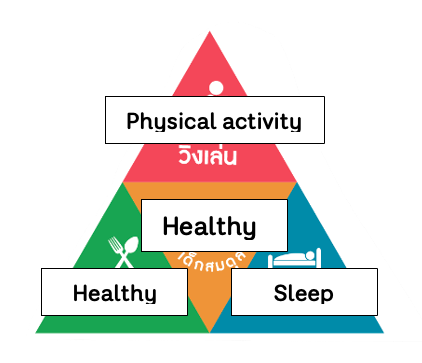
Anuban Lampang Khelangrat Anusorn School has 3,329 students from kindergarten to Grade 6. Of this figure, 20.6% were obese. In response, those students received supplementary interventions, with PE teachers leading extra sessions in the final class to promote increased physical activity, starting at 15–20 minutes and gradually increasing in duration.
Moreover, food portion adjustments were implemented, with homeroom teachers gradually reducing starches, sweets, desserts, and soft drinks rather than making abrupt changes to prevent students’ resistance. Now, the rate has dropped to 15%. Among the success stories is Latte, a Grade 6 student, who weighed 120 kilograms, had darkened skin on the neck, experienced fatigue, and was at risk of diabetes. With gradual portion reduction and positive reinforcement, his weight has dropped to 96 kilograms.
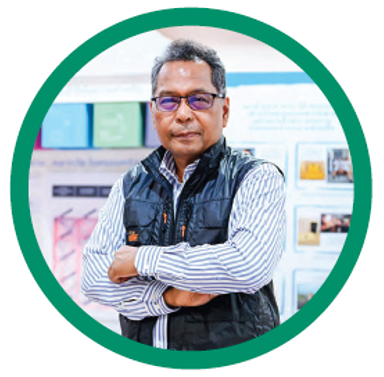
Mr. Wichet Pichairat, ThaiHealth Board Member
and Chair of ThaiHealth’s 8th Plan Executive Committee
Obesity and overweight are key risk factors for children. To address this, children should be instilled with “the Health Triangle”: eating nutritious food in the 2:1:1 ratio, with two portions of vegetables, one portion of protein, and one portion of rice; engaging in 60 minutes of physical activity each day, including aerobic dancing during the morning assembly and physical activity integrated into each subject; and having 9–12 hours of sleep.
The key to driving change is motivating children to embrace these behaviors, beginning at the kindergarten and primary school levels, enabling them to grow up healthy. To this end, ThaiHealth continues to support its local partners in promoting the adoption of the Health Triangle in more schools.
ThaiHealth’s more than ten Learning Centers across the country, including its main center in Bangkok and regional centers in provincial areas, provide learning spaces for students, the general public, and older persons. These centers feature exhibitions showcasing campaign media and live demonstrations of how health risk factors impact daily life. Mobile exhibitions are also organized to reach communities, equipping people with the knowledge and understanding needed to prevent these risks. These centers serve as hubs for ThaiHealth’s network partners to run health promotion activities.
The regional ThaiHealth Learning Center in Lampang Province is based at the Lampang Science Center for Education, covering eight provinces in the upper North. As a committed network partner, the center has successfully engaged people in learning about health risk factors. ThaiHealth contributes to these efforts by providing various media resources for public outreach and further implementation.
Regional ThaiHealth Learning Center
Empowering Students to Stay Informed on Health Risks
In collaboration with the Lampang Provincial Administrative Organization, the Lampang Provincial Elderly Council, and local senior citizen clubs, the regional ThaiHealth Learning Center in Lampang Province has developed a food safety program for older persons. The program builds knowledge through northern local dishes commonly eaten among them, encouraging reduced sodium in seasonings and the use of herbal condiments
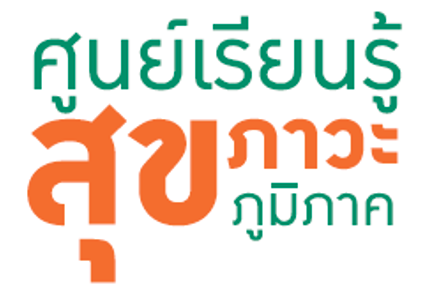
he program has also developed a simple nutritional guide using the “Green-Yellow-Red” labels to help older persons make healthy food choices, lowering the risks of diabetes, hypertension, and heart disease. It will be expanded to senior leaders in eight northern provinces by 2025.
The regional ThaiHealth Learning Center in Lampang stands out for its wide variety of exhibitions on health risk factors across all age groups.
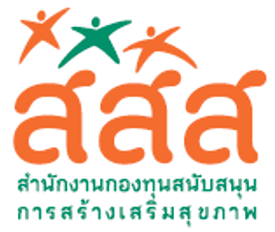
• Children – development and healthy growth, including appropriate weight and height
• Teens – sexuality, physical changes, understanding puberty, and safe and responsible sexual activity to prevent sexually transmitted diseases and teenage pregnancy
• Older persons – declining physical function and balance
• Families – exhibitions that promote understanding of age diversity within the household
Exhibitions also highlight various health risk factors, including: diet, such as high-sugar drinks and healthy eating in the 2:1:1 ratio of vegetables, protein, and rice; raising awareness of the dangers of e-cigarettes, abdominal obesity, chronic non-communicable diseases, and strategies for dealing with the dangers of social media.
Key Learnings
Mr. Sang Kanchanapermpoon
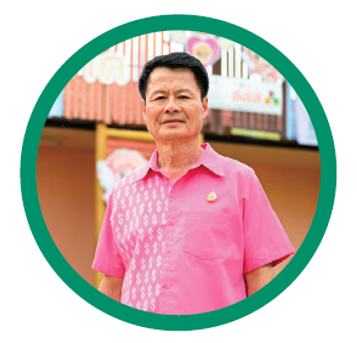
This year’s focus is on food, aligning with the STEM for Health policy. This includes promoting cultivation for safe produce, developing organic and natural farming learning centers for uncontaminated ingredients, and raising awareness about how excessive use of certain ingredients in cooking can affect health. ThaiHealth’s media resources have played a role in raising awareness among parents and children about healthy food choices.
Exhibitions at the center are regularly updated, particularly during the April school break, when new sets of resources or media may be added. Surveys are also conducted to gather visitors’ feedback, helping determine which exhibitions should be kept or updated. Updated exhibitions are rotated to be displayed at other locations, while children, schools, and older persons continue to visit and take part in the center’s ongoing activities.
Jintana Pundee, Teacher, Senior Professional Level
Anuban Lampang Khelangrat Anusorn School, Lampang Province
Teacher in the Health Triangle Program
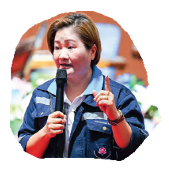
Food – encouraging children to eat more vegetables requires patience, allowing them time to adapt. Homeroom teachers manage nutrition and meal portions, and as a result, children now ask for extra vegetables. Medical professionals have also provided support with nutritional guidance, gaining strong cooperation from parents.
Physical Activity – the school makes use of its many buildings to keep students active by walking between classes. Physical education includes sports, including swimming activities for a full-body exercise. Morning assemblies feature aerobic dancing performed by the provincial champion team, and physical activity is integrated across all subjects, with teachers sometimes playing music for dancing to keep students engaged.
Rest and Sleep – a health teacher is assigned to each grade level, and homeroom teachers track children’s sleep routines via LINE groups, asking parents to send photos of their children’s bedtime. This encourages children to develop good sleep habits. As a result, their bedtimes have improved, moving from around 10 p.m. to before 9 p.m., with active cooperation from parents. The program also includes other healthy habits, such as drinking milk and brushing teeth before bed.
A key priority is to extend care to families and parents. Otherwise, some parents or grandparents may inadvertently overindulge children with food, believing that they must be well-fed. It is, therefore, vital to build understanding with families, encouraging their cooperation in safeguarding children’s health and ensuring their awareness of the negative effects of obesity on health. This approach links teachers, children, and parents in line with the Health Triangle model.



